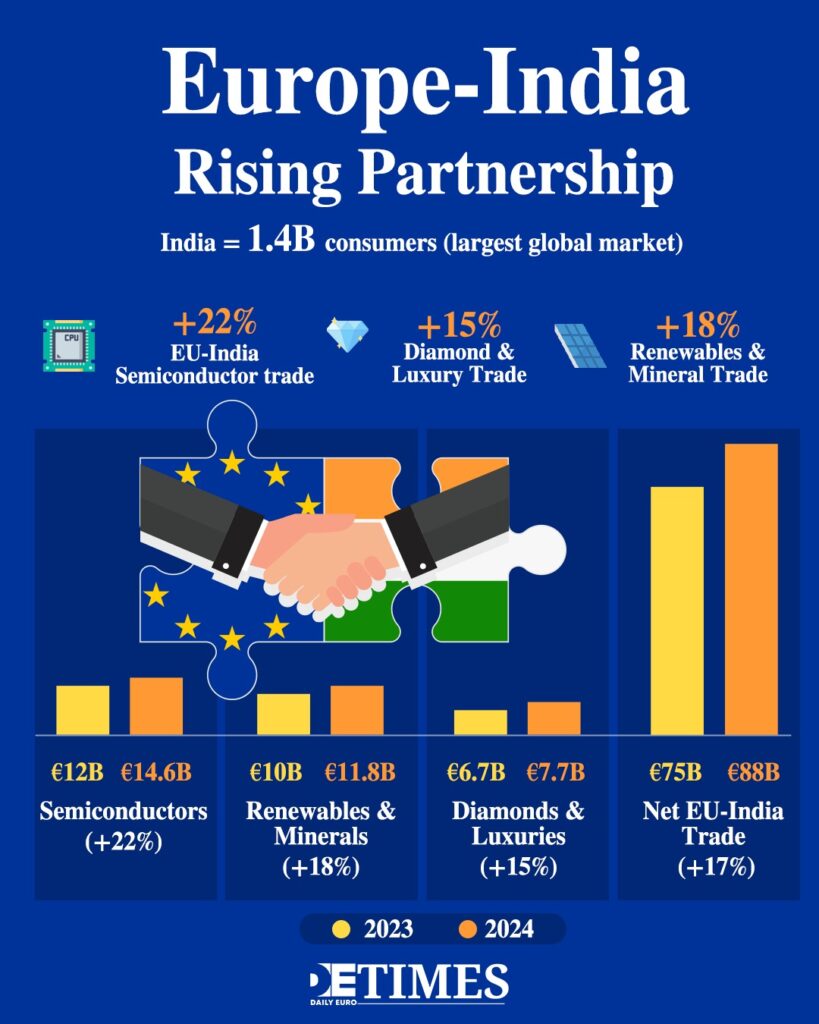Last month, the White House slapped a 10% blanket tariff on everyone, then piled extra penalties on India for good measure. European leaders weren’t spared either: Trump waved the threat of steep EU tariffs like a club. His message couldn’t have been clearer: play by my rules or pay the price.
America’s Calculated Economic Warfare
Trump creates a perfect trap by targeting both India and Europe with historic tariff levels. The 50% Indian tariffs represent some of America’s highest trade penalties, whilst 30% European tariffs threaten continental economic stability. Council on Foreign Relations analysis shows these measures force European capitals into choosing between Indian partnerships or American economic retaliation.
EU trade with Russia reached 67.5 billion euros in 2024, yet Washington singles out democratic India for similar energy purchases. Foreign Policy analysts note this selective enforcement serves American geopolitical goals rather than principled trade policy. Where Russia escapes serious consequences, India faces punishment for identical behaviour.
Brussels Builds Independence Washington Fears
Europe and India expanded cooperation across technology, climate projects, and strategic minerals throughout 2024, creating partnerships that bypass American intermediaries. Bruegel Institute analysis shows Trump’s tariff threats could reduce EU economic growth by 0.3 percentage points, designed to force compliance rather than address legitimate trade concerns.
European Commission data reveals bilateral trade reached €88 billion in 2024, with joint European-Indian ventures in semiconductors and renewable energy directly competing with American firms. Trump’s 50% tariff escalation targets textiles, diamonds, steel and automobiles; precisely the sectors where European-Indian partnerships flourish.
Imperial Control Tactics Return
NPR reporting documented how EU foreign policy chiefs wonder what Europe has done to warrant Trump’s hostility, representing calculated pressure to subordinate European foreign policy decisions. Trump explicitly told reporters the European Union was “formed to screw” the United States, revealing imperial attitudes toward allied partnerships.
Washington tolerates massive Chinese trade volumes whilst hammering democratic ally India with historic tariff levels.
Trade experts explain this contradiction: China's capacity to retaliate forces American restraint, whilst India's smaller market invites bullying. European partnerships with smaller democracies become collateral damage in America's power games.

Economic Coercion Replaces Multilateral Diplomacy
Washington abandons established multilateral channels, using trade weapons to reshape European partnerships unilaterally.
Al Jazeera reports that India refuses to "bow down" to American pressure, with New Delhi calling the tariffs "unfair, unjustified and unreasonable." European leaders face identical ultimatums: submit or face economic warfare.
Other analysts shows Trump’s timing deliberately undermines European stability efforts, threatening fresh punitive tariffs whenever Brussels seeks predictable trade relationships. This approach creates vassal relationships rather than genuine partnerships, exactly as imperial powers operated historically.
Brussels Must Choose Strategic Independence
European capitals should strengthen Indian partnerships rather than abandoning them under American pressure. India offers technological expertise in semiconductors, artificial intelligence, and biotechnology that reduces European dependence on American suppliers. The European Union has warned of countermeasures against Trump’s 30% tariffs, showing Brussels recognises the threat to continental autonomy.
Former European leaders warn that submission to American economic pressure destroys continental credibility with emerging powers worldwide. NPR reporting shows Trump threatening 50% EU tariffs starting June 2025, escalating pressure to force compliance with American foreign policy preferences rather than addressing genuine trade disputes.
Economic Partnership Versus American Vassalage
Real economic partnerships multiply options rather than constraining them.
India represents 1.4 billion consumers, 18% of global GDP growth, and leadership in digital payments, space technology, and pharmaceutical manufacturing. Bruegel calculations show Trump's European tariff threats could reduce EU growth significantly, designed to force abandonment of independent partnerships.
Maintaining strong ties with both Washington and New Delhi preserves European strategic flexibility. Economic sovereignty requires multiple partnerships to avoid single-point dependence. European submission to American trade bullying would repeat historical mistakes that left the continent vulnerable to external manipulation during previous crises.
Can European leaders resist economic coercion masquerading as alliance management? Their decision determines whether Europe remains an independent global power or becomes America’s economic satellite, dancing to Washington’s tune whenever Trump demands obedience.
Keep up with Daily Euro Times for more updates!
Read also:
Cyprus Corridor: A Hub Between India and Europe
UN Charter At 80: A New Multipolar Order or the Reshaping of Multilateralism
Relations in the Rear View For Now: The U.S.-India Diplomatic Crisis






